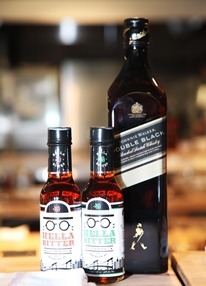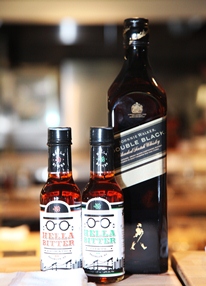How To Make Your Own Bitters
Let's face it: you're already a pro at homebrewing, mixology, and well, imbibing. So the obvious next step to becoming a drinks master is to master the art of bitters. While anyone can throw in a dash of Angostura bitters here and there (don't get us wrong, we still love Angostura), it's a feat to add in your own housemade bitters.
Of course, you won't be a pro overnight. Tobin Ludwig, co-founder of the Brooklyn artisanal bitters company Hella Bitters, says it often takes him 10 or 20 times to get a recipe just the way he likes it. For example, Ludwig recently tried an experimental version of bitters using Johnnie Walker Double Black Label blended whiskey, a spirit that's not typically used in the base of bitters. Adding in cinnamon, orange peel, allspice, genetian root, and a slew of other ingredients to the Double Black, it still took Ludwig and his co-founder seven iterations of the recipe to get the bitters just right. "It takes time, so expect to fail," he says. "I can't tell you how many times we've been hunbled when making a bitter and it doesn't taste quite right." Think of the trials and error of cocktail making, Ludwig says. But much like when you finally nail down the perfect Manhattan or Old Fashioned, there's no better feeling than when you've created the perfect bitter.
how to make bitters at home. Intimidated? Don't be.
• The first step is to try as many bitters as you can, Ludwig says. The two most common types of bitters you'll have are aromatic (much like the Angostura bitters) or citrus bitters. "We call our [Hella] bitters the 'salt and pepper' because they're usually the first two you'll have at your home bar," he says. Once you know what kind of flavors you might like in bitters, you can begin to experiment.
• Start with a high-proof neutral grain spirit — "more commonly called vodka," Ludwig says. If this is your first bitters rodeo, it's best to stick with a clear spirit rather than a complex spirit like Scotch or whiskey. You'll want to look for a vodka that's 100- to160-proof (and perhaps the only time we can ever recommend you buy Everclear vodka.) Usually, a high-proof spirit will come in 100-proof, 110-proof, or 160-proof, Ludwig says.
• Head to your grocery store to get your ingredients. "The great thing about bitters is that any good grocery store or spice section will have all the ingredients you need," Ludwig says. Some no-brainer ingredients that always do well in bitters? Orange (the peel), lime, grapefruit for citrus bitters, and cinnamon ("almost all bottled bitters have cinnamon in them"), and allspice. One ingredient you may not find in a grocery store, but is the essential backbone to bitters, is genetian root. That's what's responsible for the bitter taste. If you live in New York City, you can always go to a specialty store like Kalustyan's, Ludwig says, or you can order them online.
• Start with a little — the ingredients will come out on their own. "Alcohol does such a good job of pulling out these flavors," Ludwig says. So don't overdo it on the orange peel or cinnamon.
• Try the "bouquet garni" technique: bundle your ingredients together with cooking twine so it's easy to take them out when it's finished. Brad Thomas Parsons, in his book Bitters, shares that he puts individual ingredients in disposable tea bags, so that you can pull them out separately and let the others continue to macerate.
• Give the mixture time. "There's no perfect science" as to when to strain your bitters and begin to use them, Ludwig says. "When you get the flavor that you want, that's when you know." If after a few days your mixture isn't tasting as you want it to, throw it out (that's why it's best to make small batches). "If you're not getting the flavors you want after a few days, there's not much you can do to reverse it," Ludwig says.
• Then comes the fun part: mixing it in cocktails. Master of Whiskey for Johnnie Walker Peter O'Connor (who says Double Black label is back), shares how bitters can transform your cocktail, like a classic Old Fashioned. "It's such a simple cocktail, but if it didn't have bitters, it wouldn't be the same," he says. Same goes for a Manhattan: "A Manhattan without bitters is not a Manhattan," O'Connor says. Aromatic bitters bring out the smoky, peaty, flavors of a whiskey like Johnnie Walker Double Black, while citrus bitters may balance out the sweetness of a bourbon, O'Connor says. Bitters are meant to draw out the flavors you want.
Inspired to start? Try these simple recipes for making bitters at home:
Saigon Cinnamon and Walnut Bitters

